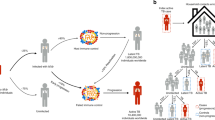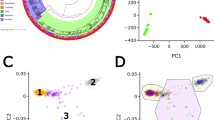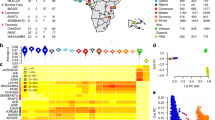Abstract
After imputation of data from the 1000 Genomes Project into a genome-wide dataset of Ghanaian individuals with tuberculosis and controls, we identified a resistance locus on chromosome 11p13 downstream of the WT1 gene (encoding Wilms tumor 1). The strongest signal was obtained at the rs2057178 SNP (P = 2.63 × 10−9). Replication in Gambian, Indonesian and Russian tuberculosis case-control study cohorts increased the significance level for the association with this SNP to P = 2.57 × 10−11.
This is a preview of subscription content, access via your institution
Access options
Subscribe to this journal
Receive 12 print issues and online access
$209.00 per year
only $17.42 per issue
Buy this article
- Purchase on Springer Link
- Instant access to full article PDF
Prices may be subject to local taxes which are calculated during checkout

Similar content being viewed by others
References
Möller, M. & Hoal, E.G. Tuberculosis (Edinb.) 90, 71–83 (2010).
Vannberg, F.O., Chapman, S.J. & Hill, A.V. Immunol. Rev. 240, 105–116 (2011).
Intemann, C.D. et al. PLoS Pathog. 5, e1000577 (2009).
Thye, T. et al. Nat. Genet. 42, 739–741 (2010).
Li, Y., Willer, C.J., Ding, J., Scheet, P. & Abecasis, G.R. Genet. Epidemiol. 34, 816–834 (2010).
Huang, L. et al. Am. J. Hum. Genet. 84, 235–250 (2009).
Huff, V. Nat. Rev. Cancer 11, 111–121 (2011).
Maurer, U. et al. J. Biol. Chem. 276, 3727–3732 (2001).
Sciesielski, L.K., Kirschner, K.M., Scholz, H. & Persson, A.B. FEBS Lett. 584, 4665–4671 (2010).
Flynn, J.L. & Chan, J. Annu. Rev. Immunol. 19, 93–129 (2001).
Ottenhoff, T.H., Verreck, F.A. & Hoeve, M. Tuberculosis (Edinb.) 85, 53–64 (2005).
Acknowledgements
Ghana. The participation of affected individuals and the volunteers who served as controls is gratefully acknowledged, as are the contributions of field workers, nurses and physicians involved in the recruitment of participants, the staff of the Kumasi Centre for Collaborative Research in Tropical Medicine (KCCR) and the excellent assistance of E. Abbeyquaye and L. Gankpala. The study protocol was approved by the Committee on Human Research, Publications and Ethics, School of Medical Sciences, Kwame Nkrumah University of Science and Technology, and the Ethics Committee of the Ghana Health Service. Consent was obtained from the enrolled individuals or from their parents or guardians by signature or by thumbprint in case of illiteracy. This work was supported by the German Federal Ministry of Education and Research (BMBF), the TB or not TB Project, the German National Genome Research Network (NGFN1, 01GS0162; NGFN2, NIE-S17T20; and NGFN-PLUS, 01GS0811), the European Union Framework Programme 7 (201483; TB-EUROGEN) and the BMBF Tuberculosis Research Network (01KI0780).
The Gambia. We thank other members of the Wellcome Trust Case Control Consortium and collaborators for previous work on the Gambian sample sets. All samples were obtained with informed consent. Ethical approval for the study was granted by the Gambian MRC and the Gambian government joint ethical committee. Sample collection was supported by the Gambian MRC Unit funding, European Commission framework Programme awards, an MRC award (G0000690 to G.S.) and Wellcome Trust fellowship support (to A.V.S.H.). Laboratory work in Oxford was supported by the Wellcome Trust.
Indonesia. Written informed consent was obtained from all subjects, and the study was approved by the ethical committees of the Eijkman Institute of Molecular Biology and the Faculty of Medicine, Padjadjaran University, Hasan Sadikin Hospital. We gratefully acknowledge S. Marzuki, R.H.H. Nelwan and J.W.M. van der Meer for their continued support of the study. This study was supported by the Royal Netherlands Academy of Arts and Sciences (KNAW; KNAW99MED01), the Netherlands Organization for Scientific Research–Netherlands Foundation for the Advancement of Tropical Research (NWO-WOTRO) (Poverty Related Infection Oriented Research (PRIOR)-project) and the European Commission (QLK2-CT-2003-503367).
Russia. The participation of affected individuals and volunteer, control individuals is gratefully acknowledged. The study was approved by the Human Biology Research Ethics Committees of the University of Cambridge and Queen Mary College, and the local ethics committees in St. Petersburg and Samara, Russia. All participants provided written informed consent before being enrolled in the study. We thank O. Ignatyeva, I. Kontsevaya, S. Mironova, I. Fedorin and N. Malomanova for the recruitment of subjects and controls, as well as E. Stebbings, L. Kopanitsa and A. Speirs for DNA preparation. During the course of this study, S.N. was a Royal Society University Research Fellow and now holds the Wellcome Trust Senior Research Fellowship in Basic Biomedical Science. This study was supported by grants from the European Union Framework Programme 7 (201483; TB-EUROGEN), the Royal Society (RG090638), the Wellcome Trust (088838/Z/09/Z) and the European Research Council (ERC; starting grant 260477).
Author information
Authors and Affiliations
Contributions
R.D.H., C.G.M. and T.T. designed the analytical approach. T.T. performed all statistical analyses. C.G.M. was responsible for the TB study in Ghana, including sample collection and laboratory work, and, together with T.T., was responsible for writing the manuscript. T.H.M.O. was the principal investigator of the Indonesian study and supervised it together with R.v.C., B.A. and E.S. E.O.-D. and J.G. led the sample procurement and supervision of field work in Kumasi and Accra, respectively. C.E., B.M., G.R. and J.S. performed all in-house genotyping. E.v.d.V. contributed to discussions at various stages. S.N. participated in sample collection, genotyping and analysis of Russian data. Y.B., V.N. and F.D. were responsible for the study in Samara, Russia, including sample collection and laboratory work. J.C. participated in DNA preparation and genotyping of the Russian samples. A.V.S.H. designed the Gambian GWAS. F.O.V., P.C.H., G.S. and M.N. were involved in recruitment of study participants at the Gambian site.
Corresponding author
Ethics declarations
Competing interests
The authors declare no competing financial interests.
Supplementary information
Supplementary Text and Figures
Supplementary Figures 1–3, Supplementary Tables 1–3 and Supplementary Note (PDF 481 kb)
Rights and permissions
About this article
Cite this article
Thye, T., Owusu-Dabo, E., Vannberg, F. et al. Common variants at 11p13 are associated with susceptibility to tuberculosis. Nat Genet 44, 257–259 (2012). https://doi.org/10.1038/ng.1080
Received:
Accepted:
Published:
Issue Date:
DOI: https://doi.org/10.1038/ng.1080
This article is cited by
-
The immunogenetics of tuberculosis (TB) susceptibility
Immunogenetics (2023)
-
Pathogenic Interleukin-10 Receptor Alpha Variants in Humans — Balancing Natural Selection and Clinical Implications
Journal of Clinical Immunology (2023)
-
Decoding the spatial chromatin organization and dynamic epigenetic landscapes of macrophage cells during differentiation and immune activation
Nature Communications (2022)
-
Genetic factors affect the susceptibility to bacterial infections in diabetes
Scientific Reports (2021)
-
Fine-mapping analysis of a chromosome 2 region linked to resistance to Mycobacterium tuberculosis infection in Uganda reveals potential regulatory variants
Genes & Immunity (2019)



